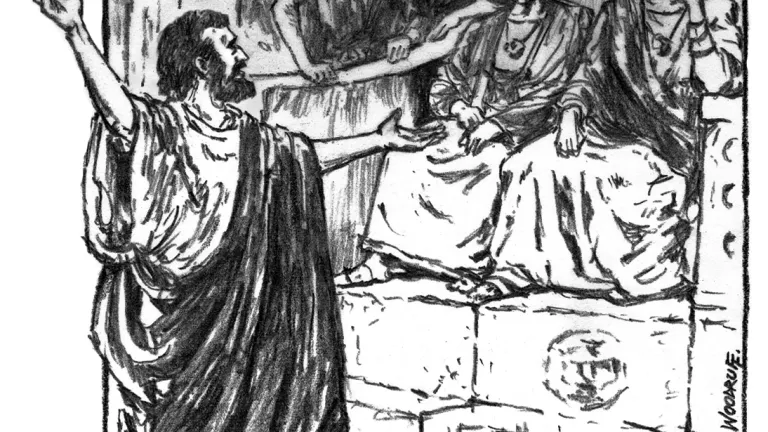"For I Also Am a Man Placed Under Authority"
Jesus had told the disciples not to abuse authority. So why would He consider a Roman centurion's explanation of authority an example of exceptional faith?
Misused authority attracts much press. In an age of political correctness, minority rights and child abuse scandals even within churches, authority often has a bad name. Yet Christ links authority with faith (Luke 7:9). How can we better understand this?
Abusive Authority Spans Millennia
"Athens holds sway over all Greece; I dominate Athens; my wife dominates me; our newborn son dominates her." So said Athenian general, naval commander and statesman Themistocles (ca. 524-ca. 460 B.C.), to explain an earlier remark of his to the effect that his baby son ruled all Greece.
In modern times Lyndon Johnson, 36th U.S. president, said: "When things haven't gone well for you, call in a secretary or staff man and chew him out. You will sleep better and they will appreciate the attention."
And, likely with tongue in cheek, Virgin Airways entrepreneur Richard Branson said: "I believe in benevolent dictatorship provided I am the dictator."
With examples of abuse of authority around us, God's Church has striven for a balance. Although Christ said, "My doctrine is not Mine, but His who sent Me" (John 7:16-17), we'll occasionally hear it said, "Doctrine doesn't matter, only relationships." Or, in our age of permissive child rearing, some say, "No one can tell anyone else's kids what to do." Try arguing that to the police, prisons, welfare agencies and rehabilitation centers that end up dealing with troubled youth.
With the ever present rejection of authority, we too can be tempted to not readily accept administrative decisions or Council-approved doctrinal papers. We may be tempted to parry what a minister may counsel or decide, citing ministerial abuses from the past. But is this only a deflection from submitting to authority? Yes, we must search "the Scriptures daily to find out whether these things [are] so" as the fair-minded Bereans did (Acts 17:11). However our responsibility for our own salvation does not mean we reject all authority, but that we submit to those God has given rule over us (Hebrews 13:7, 17).
What does yieldedness to authority and its right use have to do with faith, as in the example of the centurion in Luke 7? His faith was hardly demeaned by submitting to Christ's authority.
Let's consider the centurion more closely. Interestingly, several centurions in Scripture are mentioned in a positive light. Two were worshippers of God; others were involved in protecting the apostle Paul.
Centurions in the Roman World
The first gentile convert, Cornelius, was a centurion of the Italian band. Scripture says he was a devout man who feared God with his entire household. And he was a just man of good reputation among all the Jews (Acts 10:1-2, 22).
The centurion who watched Christ die concluded, "Truly this Man was the Son of God" (Mark 15:39).
Commentaries explain, "Centurions were chosen by merit, and so were men remarkable not so much for daring courage as for their deliberation, constancy, and strength of mind."
Some say a centurion was the equivalent of a sergeant major. In the New Testament they are well spoken of (Acts 22:26; 24:23; 27:43). Barclay quotes Polybius as saying that centurions must not be so much "seekers after danger as men who can command, steady in action, and reliable; they ought not be over anxious to rush into the fight; but when hard pressed they must be ready to hold their ground and die at their posts."
Originally a centurion commanded 100 soldiers, but in time the number varied. Josephus talks of a grade of officers, one being below the centurion, others being above like a colonel and a general. Moffat translates centurion as "army captain" and this is probably close to what we'd be familiar with today.
The Evidence of This Centurion
The centurion of Luke 7 knew his place in the eyes of the Jewish leaders. Even though he had built a synagogue and was greatly respected, he still accepted that he was a gentile in the eyes of Judaism and was restrained by their rules from personally approaching Christ. When Christ agreed to come to him, he also tried to consider this according to Judaism's rules. He knew a devout Jew would not be permitted to enter his gentile home.
Now we have this remarkable statement about authority and faith: "But say the word, and my servant will be healed" (Luke 7:7). The centurion explained that he derived his authority from others, that he was "under authority." He didn't say he was a man "with" authority, but a man placed "under" authority. Yet who would dispute he was in command of many men?
At baptism we symbolically give up our "human rights," though we still have them physically in the world. Through unconditional surrender we become slaves to Christ, under authority to whatever is Christ's revealed will.
If I am under Christ's will, how can I reject the authority of the Church over me when it is doing His will? The centurion stated he sent one and he went; he called one and he came. He didn't have to follow up to see that it was done. Similarly, the centurion knew Christ did not need to come to his home to bring healing; He only needed to say the word and it would be. This is the belief and faith Christ marveled at.
A Loving Attitude to His Servant
A Roman slave was a living tool with no rights. A master could ill-treat him and even kill him if he chose. It is said when a slave was past his prime working years, he was thrown out to die. This centurion looked at things differently. He was clearly concerned for his servant's welfare.
He was different in other ways as well. The fact that he built a synagogue shows more than a passing interest in Judaism as well as showing that he had the means to pay for it. Jews and gentiles of the time generally despised each other. Yet despite the anti-Semitism of the time, this centurion had a close bond and friendship with the Capernaum Jewish authorities.
His Authority and His Faith
The Jewish elders argued for the centurion by saying he was deserving and "he loves our nation." The centurion had good will toward the conquered nation over which he exercised some authority. He would scarcely have undertaken the involvement of building a synagogue without some interest in the religion of the Jews.
Why did he himself not go personally to Christ but instead send a delegation on his behalf? Mindful of Jewish hatred toward Roman soldiers, he may have not wanted to interrupt a Jewish gathering or offend anyone. Believing that Jesus too might have scruples about entering the house of a gentile, he offered the explanation of his command structure: When he gave a command to troops or his servants, he did not need to be present to make it happen.
Jesus "marveled" at him and this is recorded only twice. Once Christ marveled at unbelief (Mark 6:6) and on this occasion about faith.
Christ marveled because the centurion's faith was firm belief that if Christ commanded, it would be done. Many Jews and Israelites, by contrast, questioned His authority, didn't believe what He said and rejected His teaching. The centurion clearly knew he was under Roman authority and that Christ had the spiritual power to grant healing if He chose.
It is easy enough to submit to authority when we are in agreement. We know too it can be difficult if we aren't. For Christians it's a positive challenge to trust in God-given authority as the centurion did.
We have a marvelous spiritual invitation: to build a faith that might similarly be "marveled" at by Christ. UN





